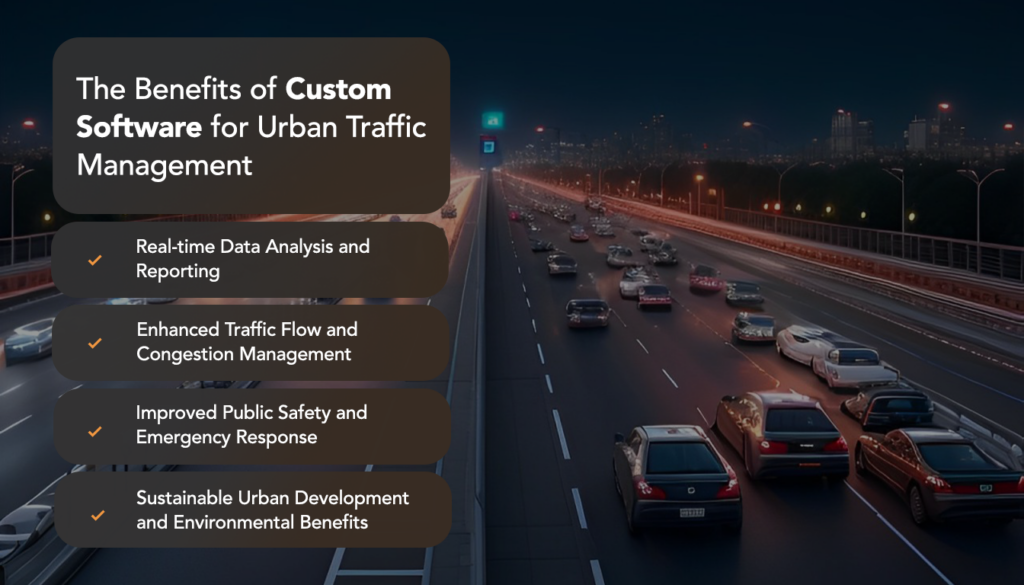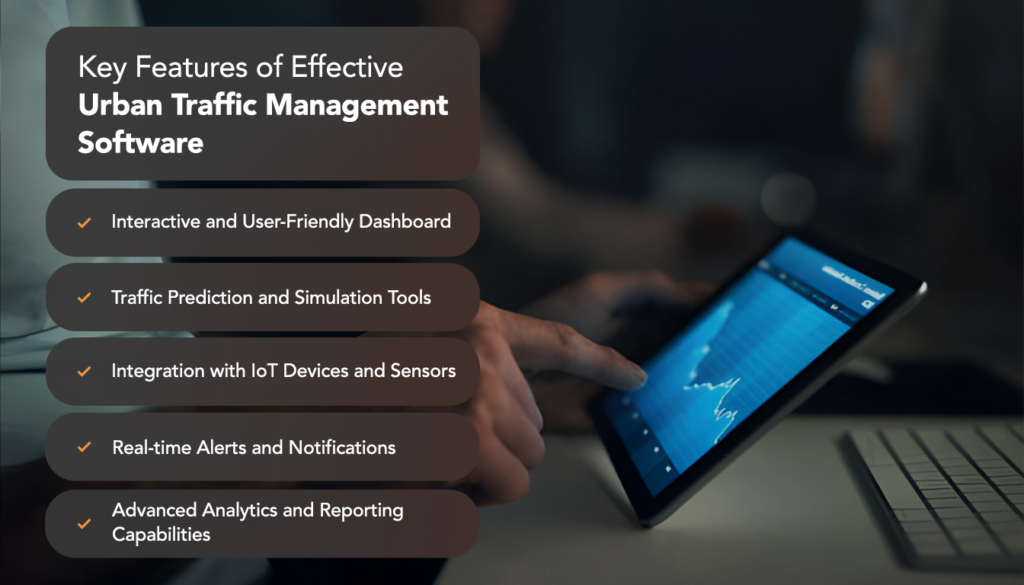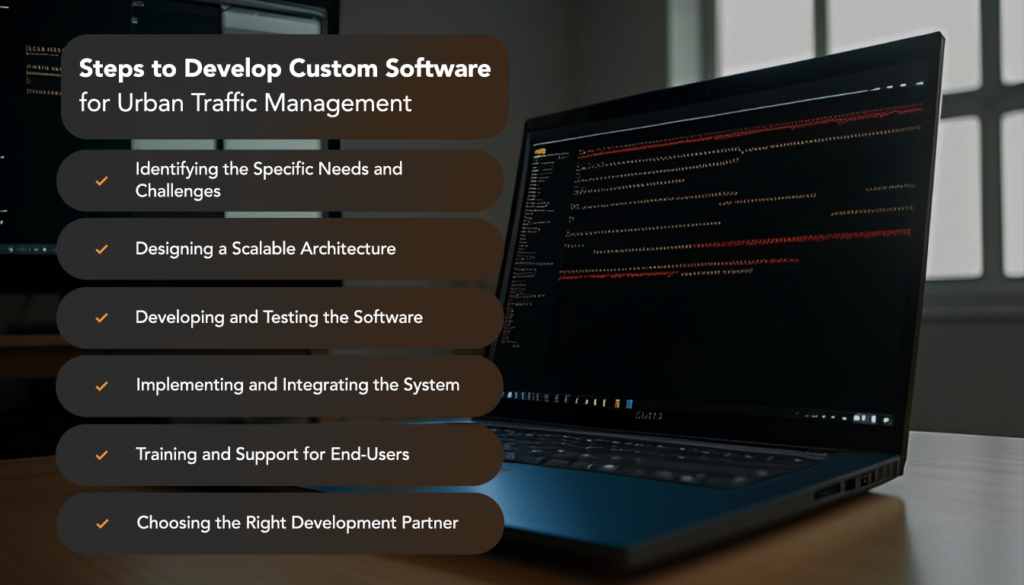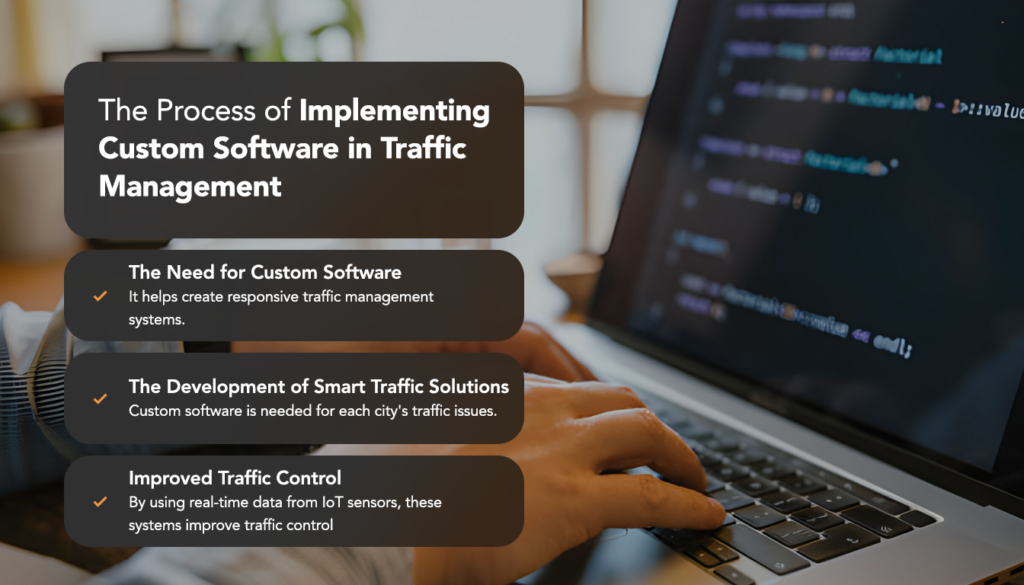How to Develop Custom Software for Urban Traffic Management
 3 May 2024
3 May 2024? Listen to the Summary of this article in Audio
Did you know that in the U.S., an average commuter spends 54 hours a year in traffic jams? The Texas A&M Transportation Institute reports this. This fact highlights the urgent need for new traffic solutions. Custom software for traffic control is changing the game in urban areas. It is leading cities into a new era where traffic management is more personalized. By creating custom software, cities are making travel smoother. They’re also giving urban areas the tools to fight congestion and improve life quality.
Custom urban software is leading digital innovation, transforming cities into smarter spaces. Introducing smart traffic solutions through software development is key. It’s not just about easing daily traffic; it’s about preparing cities for future challenges too. Urban planners have new technologies to tackle unique local problems. This makes traffic systems more effective, enhancing sustainability and living standards in cities.
Key Takeaways
- Custom software development for traffic control is pivotal for alleviating urban traffic congestion.
- Custom urban software empowers cities to craft personalized, efficient urban traffic solutions.
- Tailored urban traffic management software is essential in the transition to smart city ecosystems.
- Urban traffic solution innovations are crucial for enhancing commuter experiences and reducing congestion.
- Software development for traffic control is key to sustainable urban development and improved city living.
The Need for Custom Software in Traffic Management
Metropolitan areas are changing, bringing in advanced traffic management systems. These systems aim to make transport more efficient worldwide. They tackle congestion and improve movement with urban traffic software.
This method supports smart traffic solutions, adapting to each city’s traffic needs.
The search for smooth urban travel reveals that a general solution doesn’t work. Custom software is needed for each city’s traffic issues. It helps create responsive traffic management systems. By using real-time data from IoT sensors, these systems improve traffic control. They also adapt to changes, helping cities manage traffic better.
The Benefits of Custom Software for Urban Traffic Management
Urban areas benefit greatly from custom traffic management systems. These systems improve city life by making it safer and more efficient. Here are the main ways that custom traffic software helps manage busy city streets.

Real-time Data Analysis and Reporting
With traffic optimization software, city leaders can watch and manage traffic in real time. They can make quick decisions to keep traffic flowing smoothly. This use of traffic optimization tools gives a clear view of traffic changes, allowing for a quick response.
Enhanced Traffic Flow and Congestion Management
The goal of city traffic management software is to reduce congestion and improve traffic flow. It uses smart algorithms to foresee busy times and adjust traffic signals. This leads to less waiting and fewer traffic jams, making city travel better for everyone.
Improved Public Safety and Emergency Response
Keeping the public safe is crucial. Here, traffic control technology plays a key role. It ensures that emergency responders can move quickly during critical times. This can save lives by cutting down on response times.
Sustainable Urban Development and Environmental Benefits
Custom traffic systems are good for the environment as well. They make traffic smoother, which cuts down on harmful gases. This helps cities grow in a greener, more sustainable way.
Technology, especially custom-designed traffic systems, is essential as cities aim to be more efficient. These systems not only make traffic better but also help cities achieve their sustainability goals.
Key Features of Effective Urban Traffic Management Software
Urban traffic management needs software that’s not just powerful but smart. It must fit the modern smart city. Features like traffic monitoring and data analysis are key. They help create effective traffic management plans.

1. Interactive and User-Friendly Dashboard
The dashboard is central to traffic management software. It links information and controls. It must be easy to use and provide quick access to important data. A well-designed dashboard makes it easier to respond to traffic changes.
2. Traffic Prediction and Simulation Tools
Traffic prediction tools are vital for planning a city’s transport. They predict congestion and disruptions. This helps in planning ahead to keep traffic smooth.
3. Integration with IoT Devices and Sensors
IoT devices bring new ways to manage urban traffic. They use sensors to collect detailed traffic data. This helps the software monitor and analyze traffic flow in detail.
4. Real-time Alerts and Notifications
In emergencies, quick action is crucial. Traffic software with real-time alerts helps reduce response times. This keeps traffic moving smoothly, even during surprises.
5. Advanced Analytics and Reporting Capabilities
Deep analytics are a must-have for traffic management software. They turn data into useful reports. This helps leaders make informed decisions based on detailed traffic analysis.
| Feature | Functionality | Impact on Traffic Management |
|---|---|---|
| Interactive Dashboard | Centralized traffic data visualization | Enhanced situational awareness and decision-making velocity |
| Traffic Prediction Tools | Forecasting and simulation of traffic patterns | Proactive management of congestion and optimization of traffic flow |
| IoT Integration | Real-time data collection from a citywide sensor network | Granular monitoring and adaptive traffic controls |
| Real-time Alerts | Instantaneous notifications regarding incidents or changes | Quick response to disruptions, ensuring public safety and traffic fluidity |
| Advanced Analytics | Deep analysis and reporting of traffic data | Strategic planning powered by data-driven insights |
Our team of experienced developers can build a tailored software system to meet your city’s unique traffic needs.
Steps to Develop Custom Software for Urban Traffic Management
Developing custom solutions to manage city traffic needs a well-planned approach. This guide explains the important steps from start to finish. It covers everything needed to make traffic solutions work well.

1. Identifying the Specific Needs and Challenges
The first step is analyzing the city’s traffic to understand its unique problems and needs. This analysis helps decide what features the software must have. It ensures the solution fits the city’s specific traffic issues.
2. Designing a Scalable Architecture
Knowing the needs, it’s time to design a scalable system. This system must grow as the city changes and technology progresses. It’s vital that the software can adapt to these changes easily.
3. Developing and Testing the Software
With a plan in hand, the next step is to build and test the software. Testing makes sure the software works well in different urban conditions. This step is crucial for reliable traffic solutions.
4. Implementing and Integrating the System
The developed software must then be added into the city’s current system smoothly. It’s important for new solutions to work well with old systems. This helps create improved traffic management.
5. Training and Support for End-Users
For the software to be successful, users need training and support. This ensures they can use the system well. Proper training helps achieve the goals of better traffic management.
Choosing the Right Development Partner
The last step is picking the right partner for software development. Choosing a partner experienced in urban traffic management is key. The right partner brings expertise and aligns with the project’s vision.
| Development Phase | Action Items | Outcome |
|---|---|---|
| Needs and Challenges Identification | Conduct analysis. Gather data on traffic patterns and infrastructure. | Customized feature list to address specific urban traffic needs. |
| Scalable Architecture Design | Develop flexible system architecture that can expand with demand. | A resilient and adaptable traffic management framework. |
| Software Development and Testing | Build and test software iteratively, refining features based on feedback. | A reliable, user-validated software ready for deployment. |
| System Implementation and Integration | Plan and execute the integration of new software with city infrastructure. | Seamless functionality within the urban traffic ecosystem. |
| Training and User Support | Provide comprehensive training programs and user support systems. | End-users fully equipped to utilize the traffic management solutions. |
| Development Partner Selection | Choose a partner with expertise in urban traffic management. | A collaborative and expert-led development process. |
Challenges in Developing Custom Software for Traffic Management
Creating traffic management software involves tough challenges. These issues are technical and about how people use these solutions. It’s key to tackle these complex problems for the software to work well.
Handling Large Volumes of Data
The big challenge is dealing with lots of data from traffic solutions. Systems need to quickly process information from sources like sensors and cameras. They require a setup that can handle lots of data well.
Ensuring System Scalability and Reliability
As cities grow, traffic software must adjust. It’s crucial that the system can take on more without losing performance. Developers need to plan for future traffic and growth to keep the system reliable.
Integration with Existing Infrastructure
New traffic software must fit smoothly into the current city setup. It needs to work with old systems and technologies. Making sure this integration goes well requires careful testing and updates.
User Adoption and Change Management
The best traffic system needs people to use it – like city staff and monitors. Making easy-to-use interfaces and offering training is key. Also, getting people used to new ways of doing things is important for moving to better traffic solutions.
Our experts can help you navigate the complex process of developing reliable, scalable traffic management software.
Future Trends in Urban Traffic Management Software
The world of urban traffic management is changing fast, thanks to new tech. Cities are growing, and with that, there’s a bigger need for smart traffic solutions. Key technologies are leading the way in changing how we manage and plan city traffic.
AI and Machine Learning for Predictive Traffic Modeling
AI and machine learning are key to new traffic control methods. They move traffic management from just reacting to being proactive. By understanding huge amounts of data, AI can predict traffic and suggest ways to keep things moving smoothly.
Blockchain for Secure and Transparent Data Sharing
Blockchain is making traffic management in smart cities more trustworthy. It uses secure, clear data sharing. This means everyone from government agencies to drivers gets reliable traffic information.
Augmented Reality for Enhanced Traffic Control Operations
Augmented reality (AR) offers a new tool for traffic management teams. AR adds digital info to the real world in real-time. This helps traffic operators make better decisions by giving them more data.
The Role of 5G in Supporting IoT Integration
5G is giving a big boost to AI in traffic systems with its fast connectivity. It makes integrating IoT devices for traffic control better, enabling quick data sharing essential for managing traffic in real-time.
| Technology | Impact on Traffic Management | Benefits |
|---|---|---|
| AI and Machine Learning | Predictive Traffic Modeling | Anticipates and alleviates congestion, optimizes traffic flows |
| Blockchain | Secure Data Sharing | Enhances data transparency, improves stakeholder trust |
| Augmented Reality | Operational Efficiency | Provides immersive data visualization for traffic control operations |
| 5G Networks | IoT Device Integration | Ensures rapid data exchange, supports improved real-time traffic response |
Conclusion
The move towards smart, sustainable cities gets a big boost from traffic management software development services. Traffic systems, the heart of city life, greatly improve with investments in custom traffic management systems. These tools help manage daily traffic and create an intelligent traffic management system. This system changes as city needs do.

Every modern city needs a traffic management software solution that work well and fit each city’s unique needs. With tools like IoT and advanced data analytics, custom software is key. It builds complex urban traffic systems that are smart and responsive. This tech aims to make city living better. It ensures cities stay lively, efficient, and keep growing.
The table below shows how technology helps in managing city traffic. It highlights how good planning is vital in creating these complex systems.
| Technology Application | Benefits to Traffic Management |
|---|---|
| Real-time Traffic Data Analysis | Enables dynamic traffic routing and congestion alleviation |
| Advanced IoT Sensor Integration | Facilitates meticulous monitoring and predictive traffic control |
| Big Data Analytics | Converts vast data sets into actionable urban planning insights |
| AI-Driven Traffic Predictions | Improves traffic flow efficiency through predictive modeling |
City planners face a huge challenge: blending tech innovation with smart urban design. Custom software isn’t just an extra. It’s essential for building tomorrow’s cities. This effort will change how we move around cities. And it will improve life for people all over the world.
Let’s discuss how our custom software development services can modernize your traffic systems.
FAQ
What are the primary reasons for cities to develop custom software for urban traffic management?
Cities develop custom software for several reasons. These include managing unique traffic, improving safety, and lowering environmental harm. They tailor software to meet their specific needs.
How can urban transportation software improve traffic management in cities?
Urban transportation software boosts traffic management. It does so by analyzing data in real-time and predicting traffic jams. It also controls traffic lights adaptively and gives efficient travel advice.
What are the benefits of implementing custom traffic management systems?
Custom systems have many benefits. They monitor traffic in real-time and offer dynamic rerouting. They also speed up emergency responses and aid in future planning with insightful data.
What are the key features of effective urban traffic management software?
Great traffic management software has several key features. These include interactive dashboards, traffic prediction models, and integration with IoT devices. It also has real-time alerts and advanced analysis tools.
What steps are involved in developing custom software for urban traffic control?
To develop custom software, cities first identify their traffic issues. Then, they design scalable software and develop and test it rigorously. Afterward, they ensure effective implementation and give comprehensive training and support.
What challenges might be faced when developing intelligent traffic management solutions?
Developing these solutions faces challenges like handling huge real-time data. It also involves ensuring the software can grow, integrating with old systems, and managing user adoption.
How will AI and Machine Learning transform urban traffic management systems?
AI and Machine Learning will revolutionize traffic management. They will bring in advanced prediction models that foresee traffic changes. This helps in optimizing routes, improving traffic light timing, and meshing with self-driving car technologies.
In what ways can outsourcing traffic management software development be advantageous?
Outsourcing has many advantages. It offers access to expert knowledge and cutting-edge technology. It’s also cost-effective and scalable. This approach lets city leaders focus on strategizing rather than dealing with software issues.
How important is the role of IoT in modern urban traffic solutions?
IoT is vital. It connects sensors and devices that collect and share real-time traffic data. This enables smart analysis and traffic management decisions.
What emerging technologies are shaping the future of city traffic management software?
Future traffic software is influenced by several technologies. Besides AI and Machine Learning, there’s Blockchain, Augmented Reality, and 5G. They improve security, user interfaces, and connection speeds, leading to smarter traffic systems.









